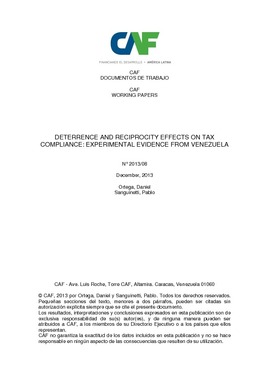Deterrence and reciprocity effects on tax compliance: experimental evidence from Venezuela
Resumo
A recent debate on tax compliance asks whether enforcement mechanisms can be complemented, or even substituted by appeals to the taxpayer’s tax morality: his or her intrinsic willingness to pay taxes, motivated by purely ethical reasons, or a feeling of reciprocity towards the government that provides public goods and services of varying quality. We evaluate this hypothesis by tracking the local business tax compliance of over 6,000 firms in a major municipality in Caracas, which we randomly assigned to a control of no stimulus, or to one of five treatment arms that received letters from the local tax administrator with different types of messages regarding tax compliance. We find that an enforcement message has the largest compliance effect, while moral suasion appears less effective. However, differences between letter types have impacts that cannot be statistically distinguished from each other, which we interpret as an effect of being contacted by the tax authority by written communication, regardless of the content. This is most likely to matter for firms unaccustomed to contact with the government –small firms– which are also those for which we find economically large effects.
Assunto
País / Región
Data
2013Cite esta publicação
Item que pertence à coleção

Items Relacionados
Moving “away" from Opportunities?: Homeownership and Employment
Homeownership is promoted by the majority of OECD member countries. Nevertheless, the impact that owning a house can have on employment levels is not ...
Taking One for the Team: Shocks at Destination and Households' Supply of Migrants
We study how unemployment shocks in the United States affect Mexican households’ migration decisions. We emphasize households at origin (as op-posed to ...
Are Taxes Credits Effective in Developing Countries? The Recent Uruguayan Experience
Investment promotion through tax incentives has been a key component of the growth strategies pursued in Uruguay by the last three administrations. A ...





